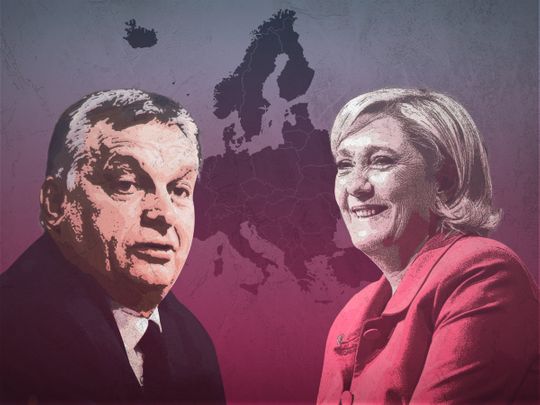
For years, the politics in Europe have been bland and boring affair, compared to the continent’s chief ally across the Atlantic, the United States. No Watergates, no Monica Lewinsky and until recent years none the likes of Donald Trump.
But as Trump, the ultra-populist who has inspired a rightwing trend in many parts of the world since coming to power in a surprising electoral win in 2016, prepares to finally bow out of the political scene in his country and fade away in the oblivion like so many demagogues before him, the US seems to have returned to political ‘normality’, whatever that means.
The former president told the Washington Post on Thursday that his health could prevent him from running for the presidency again, in 2024. Trump is 75 years old and considered obese, as per medical standards. He is known also for his love for fast food. He admitted once that his favourite breakfast is a nice meal of Big Mac.
Trump didn’t explicitly say that he was abandoning his plan to run for president in the next election, but during the course of the interview dropped many hints that he may not run after all. His health may be a valid reason (although current President Biden, at 79, is much older than his nemesis), but I suspect that Trump has by now realised that, as one of his more admired predecessors, Abraham Lincoln, said: “You can fool all the people some of the time and some of the people all the time, but you cannot fool all the people all the time.”
I reckon he knows that the failure of his brand of vulgar politics prevented him from winning a second term, that America, the melting pot, actually likes its leaders to stay in the middle, regardless of their party colours. A careful look at the policy record of successive presidents, Republicans and Democrats, will show that there isn’t much of a difference in the way they run the country. The powerful US establishment doesn’t like those who want to rock the boat.
The congressional hearings on the events of January 6, 2020, when Trump’s supporters stormed the Capitol to stop the certification of Biden’s poll victory, are expected to issue a damning verdict on Trumpism. A verdict that will serve as a warning to anyone who might flirt with the idea of even remotely rocking the US mainstream boat.
Global hotspot
With that conclusion, Europe, the land of bland and routine politics seems to have stolen the show, if we can call what has been happening in the old continent as such. We can call it that of course when the leading headline makers are the likes of Victor Orban and Marine Le Pen.
But before we go into the stunning show of those two, it must be mentioned that after decades of quiet, the guns are no longer silent in Europe. With the Russian offensive in Ukraine, Europe has become the global hotspot today, replacing the traditional spots in the Middle East or Africa.
Millions of Ukrainians are fleeing the country as Russian missiles continue to plummet their cities. The US and the European Union have managed to build a united front, until now, to punish Moscow by imposing unprecedented sanctions and supplying Ukraine with billions of dollars’ worth of sophisticated arms.
Russia’s ‘special operation’ in Ukraine is usually the type of action reserved for the US, which has launched countless ‘special operations’ in many parts of the world over the past five decades, killing millions and displacing tens of millions.
But the Russian war, while tragic and catastrophic, is not the only mover in Europe today. There are smaller, much smaller, shows that are bound to make European politics more thrilling, ala Trump.
Orban’s populism
Viktor Orban, the rightwing Prime Minister of Hungary for three terms, last week won a fourth one. The populist politician has for years defied the EU, refusing to give up his populist policies that contradict the Union’s charter.
But the EU seems to be reluctant to impose any punishment, especially now when they need all members to be on the same page vis a vis Russia, although Orban refused repeatedly to criticise the Russian offensive. May consider him a good friend of Vladimir Putin.
Volodymyr Zelenskyy, the Ukrainian president of Ukraine, said that the Hungarian premier was “out of touch” with the rest of Europe. “He is virtually the only one in Europe to openly support Mr. Putin,” Zelenskyy claimed. But that is not the only thing that makes Orban the odd man out in the EU.
He is a strong opponent of Europe’s immigration and a vocal critic of what he calls “EU bureaucrats”. In his long years in power and during his election campaign, he described himself as ‘a defender of European Christendom against Muslim migrants’, the liberals and the ‘LGBTQ lobby’. Sounds familiar?
“We won a victory so big that you can see it from the moon, and you can certainly see it from Brussels,” he said as he declared victory last week, referring to the headquarters of the EU. He won, he said, despite the efforts of “the left at home, the international left all around, the Brussels bureaucrats, the Soros empire with all its money, the international mainstream media, and in the end, even the Ukrainian president.” Again, sounds familiar?
Orban’s demagoguery has anyway won him support not only in Hungary but across Europe, which seems to have been trying to shed its old boring, but the more respectable mainstream, style of politics even if that was in favour of a Trump-style of populist, hate-filled discourse.
Le Pen and new Europe
And that explains the concerns of many in France in recent days as the Islamophobic, anti-immigrants far-right leader Marine Le Pen seems to be closing in on the leading candidate in this month’s presidential election, current president Emanuel Macron — something unimaginable just few years ago.
But today, “nothing is impossible,” Macron warned recently as the latest polls indicated that the race is tighter than many had thought just a few weeks ago. She was behind the president by double digits in the opinion polls just last month. Now, analysts say, she has a realistic chance of beating the centrist Macron.
Running on an exclusively racist agenda — strict limits on immigration from the Muslim world, total ban on Hijab in public, and a “French-first” policy when it comes to housing and jobs, a Le Pen victory will change France forever, analysts say.
The ideals of the French Revolution, Liberty, Equality, Fraternity, which inspired hundreds of democratic movements around the world, will fade away in favour of a cruel, narrow-minded, xenophobic society that could define the new Europe.
Trump, in his Washington Post interview last week, told the paper that if he decided to run for president in 2024 “a lot of people are going to be very happy by my decision... because it’s a little boring now.”
Europe, meanwhile, is in the midst of a catastrophic war that could very well turn global. Its recent elections and the upcoming ones threaten to turn the continent into a bigoted and dogmatic place — but certainly no longer boring.



_resources1_16a45059ca3_small.jpg)





